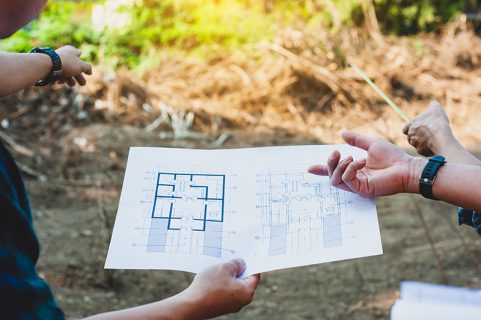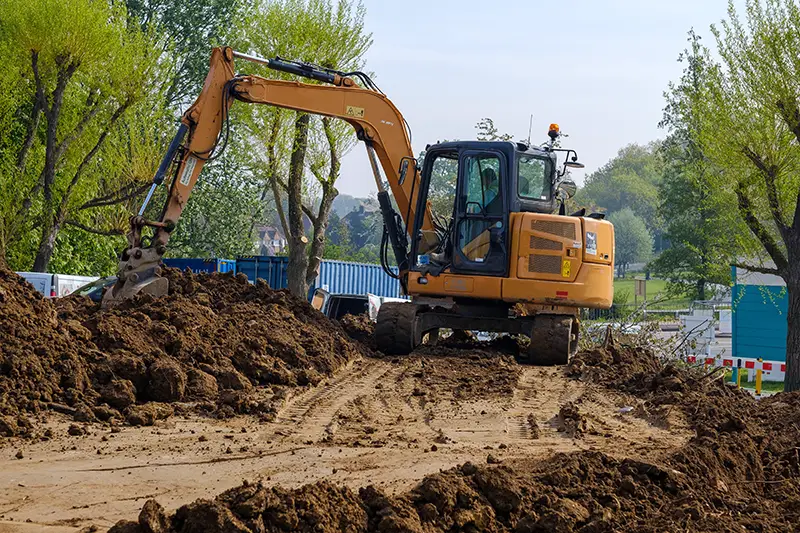Excavation work is digging up the earth, soil, and rocks to create a hole. It’s often used in construction projects, such as building foundations and roads. People also use it for landscaping purposes, such as creating ponds or hollows for planting trees. However, excavation work is a dangerous job. Many potential hazards can lead to severe injuries or death.
Excavators need to be aware of these hazards and take precautions to prevent accidents. To ensure the safety of everyone involved in excavation work, it is necessary to follow some basic safety procedures.
Here are some practicable tips to ensure safety during excavation work.
1. Plan the Work

One of the most critical aspects of planning for excavation work is to ensure that safety is a priority. There are numerous potential hazards associated with excavation work, so it is crucial to develop a comprehensive safety plan that takes all of these into account.
Some of the most common threats include cave-ins, falling debris, and exposure to hazardous materials. By taking the time to plan for these and other potential dangers, you can help ensure that everyone involved in the excavation work remains safe.
In addition to developing a safety plan, it is also important to enforce it strictly throughout the project. Whether you’re doing your excavation project or hiring other professionals, such as On Demand Excavation and similar companies, you can help reduce the risks associated with excavation work and create a safer working environment.
2. Secure the Area
It’s essential to take steps to secure the area and ensure safety. One way to do this is to erect barriers around the perimeter of the excavation site. These barriers can help prevent people from accidentally falling into the excavation and becoming injured. In addition, it’s crucial to post warning signs around the perimeter. These signs should indicate the dangers of entering the excavation area.
Finally, it’s also a good idea to have a designated safety supervisor on site who can monitor the excavation work and make sure that everyone is following safety protocols. By taking these precautions, you can ensure a safe and successful excavation project.
3. Inspect the Area
Before starting any excavation work, it’s essential to inspect the area for potential hazards. It includes looking for underground utilities, subsidence areas, and sinkholes. It’s also crucial to be aware of the type of soil in the area. Some soils are more prone to collapse than others, so it’s essential to consider this when excavating. Once the site has been inspected, then it’s time to start excavating.
“A proactive approach to subsidence not only protects the project’s integrity but also ensures that long-term solutions are implemented to maintain ground stability,” recommends Matthew O’Sullivan, CEO of the UK-based subsidence advisor Subsidence Ltd. “Conduct a meticulous inspection of the area for signs of subsidence before any digging commences. Assess soil composition, previous land usage, and nearby water sources, which can all contribute to ground instability. Addressing subsidence risks early can prevent costly structural damages and ensure the safety of the excavation team.”
However, there are a few safety precautions that need to be taken during the excavation process. First, always be wary when digging around utilities. If you hit a utility line, stop digging immediately and call the utility company. Also, always keep an eye on the sides of the excavation hole. If the sides look like they’re about to collapse, stop work and shore up the sides of the hole.
4. Use Appropriate Equipment
Excavation work can be dangerous, but it doesn’t have to be. By using the right tools and taking the proper precautions, you can keep your workers safe while they’re on the job. First, choose the right excavator for the job. If you’re working in tight spaces, a mini excavator might be your best bet. On the other hand, for larger areas, a full-sized excavator will give you more power and flexibility.
Second, make sure you have the proper attachment for the job. A bucket attachment is excellent for general excavation work, but you might need a thumb attachment or a breaker attachment if you’re doing more delicate work. Third, always follow safety procedures. Make sure your workers wear the proper safety gear and are aware of any potential hazards in the area.
5. Take Precautions with Traffic
One of the essential considerations is traffic. Excavations often take place near busy roads, and it is vital to take steps to ensure that traffic can flow safely around the worksite. Barricades should be mounted to channel traffic away from the excavation, and signs should be posted to warn drivers of the potential hazards.
In addition, workers should know to stay well away from the edge of the excavation, and you should keep heavy equipment at a safe distance from the road. Taking these precautions makes it possible to significantly reduce the risk of accident or injury during excavation work.
6. Provide Proper Training
Every year, scores of workers are injured or killed in excavation-related accidents. The risks are even more significant when excavation work is done near traffic or in other high-risk areas. That’s why employers must provide their workers with proper training in safety procedures.
One of the essential safety measures for excavation work is to be aware of your surroundings. Workers should always be aware of traffic, power lines, and other potential hazards. They should also be familiar with the specific safety procedures when they’re inside the site’s premises.
Before beginning any excavation work, workers should receive a comprehensive safety briefing from their employer. This briefing should cover all of the potential hazards at the job site and the specific procedures that need to be followed to avoid them.
7. Don’t Leave Machinery Running Unattended
One of the best ways to keep workers safe is to ensure that machinery is not left running unattended. If a piece of equipment is turned off, it can’t hurt anyone. Keep in mind that excavation work often requires heavy machinery, such as excavators and bulldozers, which can cause severe accidents.
That said, it’s essential to ensure that they are turned off when they are not being used. Even if a worker takes a break, turning off the machinery is essential.
8. Maintain Safe Distances from Excavations
One of the most important things to remember is maintaining a safe distance from the excavation site. If you are working on or near an excavation, stay at least 10 feet away from the edge of the hole. If you must work closer than 10 feet, you should use a safety harness.
Additionally, it is crucial to be aware of your surroundings and avoid anything that could collapse into the hole, such as heavy equipment or large pieces of debris. Finally, always have a plan for escape in case of an emergency, and make sure that everyone on the job site knows the contingency plan.
9. Monitor Excavations Closely
One of the most critical aspects of excavation safety is close monitoring of the worksite. Excavations can be dangerous, and any potential hazards must be identified and addressed quickly. There are various ways to monitor an excavation site, and the most effective approach will vary depending on the specific work being done.
However, some general tips for close monitoring include having a trained observer on-site, conducting regular check-ins with workers, and keeping a close eye on weather conditions. By following these simple guidelines, you can help to ensure that your excavation work is safe and compliant with all relevant regulations.
10. Ensure Adequate Lighting
One way to take precautions is to ensure adequate lighting. Excavation sites are often dark, and poor lighting can lead to accidents. In addition, workers will see potential hazards more easily if all the areas are well lit. Adequate lighting can also help improve communication between workers, which is essential for a safe and efficient work site.
There are several ways to achieve adequate lighting, such as using floodlights or portable spotlights. However, it’s essential to consult with an experienced excavator before making any decisions about lighting, as they will be able to advise on the best way to light the site and ensure the safety of workers.
11. Review The Emergency Plans
Reviewing the emergency plans is one of the most important ways to enforce safety during excavation work. Everyone must know what to do to stay safe if something goes wrong. You should review the emergency plan regularly, and all workers should be familiar with the procedures. In an accident, the first step is to call for help and evacuate the area.
If possible, the area should be cordoned off so that no one else can enter. Once the authorities have been notified, they will be able to provide further instructions on how to proceed. By reviewing the emergency plans regularly, you can help to ensure that everyone knows what to do in the event of an accident.
12. Be Watchful Of Weather Conditions
One of the most important ways to stay safe during excavation work is to be aware of the weather conditions. High winds can cause trees and limbs to fall, posing a serious threat to workers. Heavy rain can also lead to flooding, washing away equipment, and destabilizing the ground.
As a result, it’s essential to pay close attention to the forecast and ensure that workers are aware of any potential hazards. In addition, extreme heat or cold can create hazardous conditions, so it is essential to dress appropriately and take breaks as needed. If the weather looks particularly dangerous, it may be necessary to suspend work until conditions improve.
Takeaway
Excavation work can be dangerous if the proper precautions are not taken. By following the tips mentioned in this article, you can help ensure a safe and productive worksite. Remember to review the emergency plans regularly, monitor the excavation closely, and be aware of the weather conditions. With these simple measures in place, you can rest assured that you will carry out your excavation work safely and efficiently.
